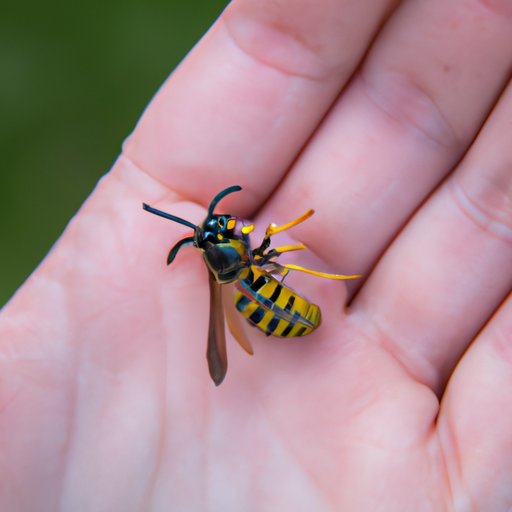
I. Introduction
Summer is a time for outdoor fun, but it also comes with risks like getting stung by wasps. According to the American College of Allergy, Asthma & Immunology, up to 0.5% of the general population experiences severe allergic reactions to stings, and varies from country to country.A wasp sting isn’t just painful, it can also cause swelling, itching, and in some cases, severe allergic reactions.
II. Home Remedies
When you get stung by a wasp, it’s important to treat the area immediately to relieve the pain and reduce the swelling. There are many natural remedies that you can try at home to alleviate the pain and relieve discomfort. A cold compress is a quick and easy way to get immediate relief. Simply put some ice in a towel and apply it to the affected area for about 10 minutes. Another natural remedy is to apply a baking soda paste made by mixing baking soda and water. Essential oils like lavender and peppermint can also help reduce pain and inflammation.
III. Medical Treatments
If home remedies don’t provide enough relief, over-the-counter or prescription medicines can help to relieve symptoms. Painkillers like ibuprofen or acetaminophen can help reduce pain and inflammation, while antihistamines can help reduce itching. In severe cases, corticosteroids like prednisolone or dexamethasone may be prescribed to reduce swelling. For those with severe allergic reactions, an EpiPen may be necessary. It’s essential not to self-medicate in case of severe symptoms and seek medical attention immediately.
IV. Prevention Tips
Preventing wasp stings is the best way to avoid the pain and discomfort that comes with it. It’s impossible to completely avoid wasps, but certain precautions can help reduce the risk of getting stung. Avoid wearing bright colors, floral prints, or perfumes when spending time outdoors. If you’re having a picnic or eating outside, cover food and sugary drinks or use insect repellent. Minimizing the number of nests present in and around your home is another effective prevention method, and physicians or entomologists can provide stinging insect avoidance education.
V. Emergency Situations
Knowing when to seek medical attention is crucial if you have a severe reaction to a wasp sting. Symptoms like shortness of breath, swelling of the face or throat, and dizziness can quickly become life-threatening if left untreated. If you experience these symptoms, call 911 right away and inform them of the situation to get medical attention as soon as possible.
VI. Home & Garden
Preventing wasp nests from forming is an effective way to avoid getting stung. The most effective way to prevent wasp nests in your home and garden is by cleaning up any fallen fruit and food debris, sealing garbage bins and compost, and sealing any cracks in the walls or roof that could provide shelter. Keep flowers like marigolds and geraniums away from your home and garden, as they attract wasps.
VII. Fun Facts
Did you know that wasps play an essential role in the ecosystem? They help pollinate crops, control pest populations, and are even used in cancer research! There are more than 30,000 species of wasps, and they come in a range of sizes, from as tiny as 0.1 mm to some reaching up to 11 cm in length.
VIII. Conclusion
Getting stung by a wasp can be painful and uncomfortable. However, there are many home remedies and medical treatments available to alleviate the symptoms. Preventing wasp stings in the first place is the best approach, by minimizing the number of nests present in your home and garden. Understanding when to seek medical attention in the case of severe reactions is crucial. Appreciating the role wasps play in the ecosystem is also a great way to respect and coexist with them.




